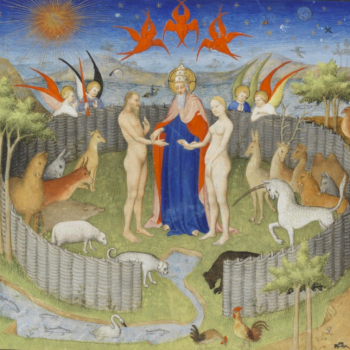 Do we really have to listen to arguments about whether the confederate flag, (deliberate typo), over South Carolina’s Capitol should come down? It’s a smoke screen. It shouldn’t take up any air time at all. We’ve got more important things to address. Don’t get me wrong; it should definitely come down, but that should’ve been taken care of already. Making it some huge cause now, as though we just noticed how ridiculous it is, trivializes a terrorist act on our soil. It provides a smoke screen for the systemic horror that erupted last Wednesday night to continue unabated. It should have been taken care of already.
Do we really have to listen to arguments about whether the confederate flag, (deliberate typo), over South Carolina’s Capitol should come down? It’s a smoke screen. It shouldn’t take up any air time at all. We’ve got more important things to address. Don’t get me wrong; it should definitely come down, but that should’ve been taken care of already. Making it some huge cause now, as though we just noticed how ridiculous it is, trivializes a terrorist act on our soil. It provides a smoke screen for the systemic horror that erupted last Wednesday night to continue unabated. It should have been taken care of already.
Our problem isn’t the flag, or the names of highways. Those are reflections of our problem. Our problem is racism. That’s what we need to be talking about. What can I do about the festering racial wound threatening our society? That’s what I want to know and I’m not the only one.
In theory at least, I’m not a racist, which is to say that I have excised any racial slander, or prejudice, or overt attitude (by which I mean visible to me, internally or externally), from my life. I am a pastor who has taken a strong verbal stand against a racial slur when I first served my last congregation, but I don’t think I’m particularly special in this regard. I think there are a lot of people like me – I’m guessing (or at least hoping), that we’re a significant majority. In any case there are lots of people who do not identify as racist, lot’s of people frustrated by its maniacal persistence. (Jon Stewart’s Charleston statement got millions of views on YouTube after all. Thank you Jon.) Yet this persistent blight spews out violence with great regularity, while keeping huge swaths of our citizens from fully participating in society. Why? I think we’re a bit stymied as we try to figure out what to do, how to move forward. I don’t have a particularly profound answer, but I do have one little drop of a thought I’d like to put into the conversation.
So why is this problem so persistent? In part I think because culturally we are so far apart. It’s a sad truth that we don’t rub shoulders often enough to develop common ground with one another. I’m a “progressive” Presbyterian pastor. You’d think I’d have a lot in common with the people who were studying Bible at Emanuel African Methodist Episcopal Church last Wednesday night, but I don’t. It is likely as not that the really fine people studying the Bible that night would call my theology into question and that would be just the first divide we’d have to cross. (Though given the way they treated Dylann Roof, I’d have to say they would be better than most at crossing it.) Our “socio-economic circumstances” would likely have been different enough to require significant effort to relate. It’s true that we would at least have had common religious language as a starting point, but what about the parts of the African American community that don’t go to church? What about those who live in abject poverty? How can I begin to wrap my mind around a worldview that assumes, as Howard Thurman once put it, that there is for them “little protection from the dominant controllers of society and less protection from the unrestrained elements within their own group?” What about those people? How am I going to find ways to relate to them? To add to the problem of separation, (and separation, the antithesis of love, is at the root of all human cruelty), a good portion of African-American society has developed a dialect that I don’t understand half the time. To be clear, I’m absolutely not complaining, or blaming. I’m NOT saying, “They should learn how to speak English correctly. After all, from they’re equally valid point of view, they’re speaking it every bit as correctly as I am. So no, I’m not blaming, I’m simply explaining how thoroughgoing the separation is. My point is that there is a cultural chasm between us and if we, (white people who do not identify as racist), want to do something about racism we’re going to need to close that gap. (And don’t you dare say, “They should make the effort too.” It’s not like we’re operating from the moral high ground you know.) If we do not at least understand one another, develop a shared language, we won’t know how to proceed. So if we really want to address this, listening would be a good place to start. But listen to who? It’s not like African-American society is monolithic. I guess I think we might start with those who seem farthest away, with those who speak most plainly.
So let me ask you this: do you ever listen to rap or the larger genre of music, hip hop, to which it relates? Most nice, white, liberal folk of my generation will say, “Yes, a little, but it’s not really my thing.” If you probe a little deeper you’ll find both tolerance and discomfort. I get that; a lot of it makes me uncomfortable too. That’s kind of the point. It isn’t my thing and that is precisely why I should be familiar with it. I should at least be conversant with the spectrum of cultural forces that shape our society, not just the ones that shape my little part of it. Please don’t misunderstand me here, I am certainly not saying that Hip Hop defines African-American culture, rather my point is that we need to move “outside our comfort zone,” as they say, to find common ground with the “other.” My point is that we need to hear, and understand other cultures, other worldviews, so that we can develop common language and understanding. Listening to Rap would be one way among many, many more, to do that. I mention it because for those of you I’m writing to, it’s a challenge. Not so much a challenge to listen, the challenge is not to judge.
It won’t solve anything if we don’t want to understand, if we are just listening to judge the other. “It’s so violent,” I’ve heard people say. “The language is just awful. I don’t understand the words. What are they talking about anyway?” Well yeah, that’s the point! It’s pretty removed from our experience – hence the separation. It’s persistent because developing shared language and understanding, across cultures, is a huge undertaking, and it only happens one person at a time.
So, a practical suggestion: several years ago Yale University Press published an Anthology of Rap. That’s right, Yale University Press believes that at an academic level this poetry needs to be read and taken seriously. Like any good art, it communicates in profound and meaningful ways. I started reading it, then put it down, then picked it up again. That’s been the pattern for several years. It’s not my worldview. It makes me feel uncomfortable, (as well it should), it’s hard to absorb. That’s the point.
Over time I’ve heard these poets reach for understanding, scream in despair, let their imaginations soar, blame the dominant culture, (mine), and sometimes too they sharpen their pen and slice into their own cultural assumptions as only they have a right to do.
It is uncomfortable to read, but I wonder if this isn’t the sort of thing that we need to do to address racism. What do I think it would do if more people sought ways to actually understand and not judge another culture? Will it change anything? Not immediately, but I’d venture to say that if more of us read this poetry, or listen in some other way, the insights we gain would make it into our conversations. Those insights would have something to do with the way we handle our own lives, view our own economic position, impact who we vote for and would therefore influence what our politicians talk about and care about. If we remain separate though, we’ll never come together.
I’m going to start reading again. I’ll probably write about the poetry from time to time – at least I hope I will. (You all remind me if I don’t, OK?) It’s not “the answer,” but it sure beats talking about removing that flag. I mean really, that hasn’t happened yet?














